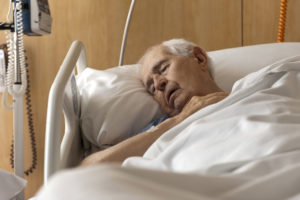
Delirium, a sudden onset of confusion frequently seen in older patients, was once thought to be a temporary condition that patients “snapped out of” after being discharged from the hospital. However, it is now recognized that delirium may lead to longer-term cognitive impairment and poor health outcomes, including an increased risk of death, nursing home placement and memory problems.
The serious consequences of even a single episode of delirium in older hospitalized patients was the impetus for a review and analysis study led by researchers at Brigham and Women’s Hospital and Beth Israel Deaconess Medical Center. The study analyzed the effectiveness of the Hospital Elder Life Program (HELP), which focuses on nonpharmacologic delirium-prevention strategies. Adopted in October by the American Geriatrics Society as one of its basic essential collaborative care programs, HELP has been implemented at hospitals across the country—including at the Brigham, where an adapted version of the program has been in place for about five years.
“HELP is a clinically effective, cost-effective program that can help prevent delirium,” said Tammy T. Hshieh, MD, MPH, one of the study’s lead researchers and an associate physician with the Brigham’s Division of Aging. “Here at the Brigham, we implement a variety of these strategies across several services, including oncology, orthopedic, trauma and surgical services.”
Those strategies include special training for nurses on assessing patients for delirium and reorienting patients every day, sometimes every shift, as to who they are, where they are, what day it is and why they are in the hospital. Nurses also help patients keep track of their sensory devices, such as glasses, hearing aids and dentures. Food service staff are trained to observe and prevent those devices from being carried away on food trays after patients have finished eating.
An Ounce of Prevention
Since sleep deprivation and changes in the sleep/wake cycle are linked to delirium, hospital staff requests no vital checks or nonessential medicine delivery overnight to ensure patients can have an uninterrupted sleep. Additionally, staff minimizes overnight procedures such as X-rays, ultrasounds and bowel preps. Dimmable lights are installed in patient rooms and hallways, and environmental services staff are asked not to clean floors or vacuum during overnight hours.
Other HELP strategies implemented at the Brigham include improving patients’ hydration levels, nutrition and hand hygiene. Special attention also is given to pain management and infection prevention. Brochures about delirium are provided to families and patient advocates to improve understanding of the condition and how to assist their loved one.
“These high-touch, low-tech interventions make a big difference in preventing falls and other downstream complications of delirium,” Dr. Hshieh said. “They also significantly reduce health care costs, saving an estimated $1,600 to $3,800 per patient in hospital costs and more than $16,000 per person-year in long-term care costs in the year following an episode of delirium.”
While age, severe illness and cognitive impairment are all known risk factors for delirium, Dr. Hshieh noted that the medical field is still trying to understand the condition’s root cause. To that end, she and colleagues at the Brigham, Beth Israel and Brigham and Women’s Faulkner Hospital are studying potential inflammatory biomarkers that would allow them to identify high-risk patients.
“Some say delirium is the most common, underdiagnosed condition in older people,” she said. “That’s why it’s so important to integrate geriatrics into other hospital services, where we can identify patients at high risk and intervene to treat those with the condition.”
Decreasing the Incidence of Delirium
According to Dr. Hshieh, thanks to early identification and these non-medication interventions, surgeons at the Brigham are already seeing a reduction in the incidence of delirium among older patients.
“The Brigham understands the significance of delirium and does an excellent job integrating bench research with clinical interventions that help patients at the bedside,” she concluded. “Our geriatricians have become quite passionate about delirium and have risen to the challenge of preventing and treating this serious condition.”